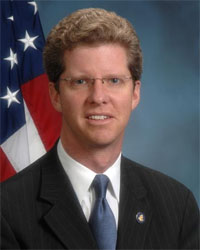HUD secretary first cabinet member to address transgender event

HUD Secretary Shaun Donovan
U.S. Secretary of Housing and Urban Development (HUD) Shaun Donovan became the first United States cabinet secretary to address a transgender event when he gave the keynote speech November 15 at the eighth anniversary celebration of the National Center for Transgender Equality (NCTE).
Mara Keisling, executive director of NCTE, told Keen News Service, “Having Secretary Donovan keynote our event is an important symbolic and historic advance for transgender Americans.”
Keisling said that having a cabinet member address the group, “really shows tremendous societal movement.” She attributes this progress to “all the great education that transgender people and allies are doing all over the country.”
“It’s added up to a lot more visibility and understanding,” said Keisling.
Prior to Donovan’s appearance, the highest federal official to address NCTE was Kathy Greenlee, Assistant Secretary for Aging at the U.S. Department of Health and Human Services. Greenlee spoke at the organization’s policy conference in March. And Lynn Rosenthal, the White House Advisor on Violence Against Women, met with NCTE staff and other transgender advocates November 16 to discuss violence against transgender people.
But Donovan’s speech, at the historic Mayflower Hotel in Washington, D.C., garnered almost no attention in the mainstream press.
HUD included a copy of his speech on its Web site. And, following his speech, Donovan spoke to a reporter from a Washington, D.C., gay newspaper, Metro Weekly. When asked whether he supports marriage equality, Donovan replied “absolutely.” He also agreed with the reporter’s suggestion that marriage equality should be the subject of “more work” in a second Obama administration.
But, at NCTE’s annual event, Donovan spoke of the Obama administration’s accomplishments towards equality for transgender people.
He said the administration is the first to view the fight for transgender equality “not as an issue—but as a priority.”
Quoting figures from a February 2011 study by NCTE and the National Gay and Lesbian Task Force, Donovan said an estimated one in five transgender Americans have been refused a home or apartment, and more than one in ten have been evicted because of their gender identity or expression.
There are currently no explicit federal protections that ban housing discrimination based on sexual orientation or gender identity. Only 15 states plus the District of Columbia have protections specific to gender identity. (Massachusetts will become the 16th when Governor Deval Patrick (D) signs a bill just passed by its legislature, as he is expected to do.) Approximately 150 cities, towns, and counties have LGBT protections as well, according to HUD.
Such protections are needed, Donovan said, because of experiences such as that of Mitch and Michelle DeShane. When Michelle wanted to add her partner Mitch, a transgender man, to her housing voucher, the local housing authority refused because the couple did not meet its definition of “family.” It referred them to a neighboring housing authority, which, they said, “accepts everyone—even Martians.”
Donovan asserted, “That’s just wrong.”
Donovan said “the most significant step” HUD has taken to address this type of discrimination has been by proposing new regulations to “ensure transgender individuals and couples can be eligible for our public housing and Housing Choice Voucher programs that collectively serve 5.5 million people.”
The proposed rule would prohibit owners and operators of HUD-assisted or -financed housing from inquiring about applicants’ sexual orientation or gender identity, and prevent them from excluding otherwise eligible families if one or more members is or is perceived to be LGBT. It would also prevent lenders from using sexual orientation or gender identity of an applicant as a basis to determine eligibility for Federal Housing Administration (FHA) mortgages, which represent one-third of all new mortgages in the country.
Donovan said that HUD is still reviewing comments before final publication of the rule.
A HUD spokesperson said that the agency cannot say exactly when the final rule will be published, since it must also be reviewed by the Office of Management and Budget.
Donovan noted that HUD has provided its staff with guidance that they can pursue cases of housing discrimination when a person’s identity or expression doesn’t conform with gender stereotypes, because such discrimination violates the Fair Housing Act’s ban on sex-based discrimination.
The Act is a pivotal civil rights act that prohibits discrimination based on race, color, religion, national origin, sex, disability, and familial status—but does not specifically cover sexual orientation- or gender identity-based discrimination.
Since that guidance was issued in July 2010, Donovan said, the number of complaints from LGBT individuals to HUD about housing discrimination has increased 15 times compared to the same date range the previous year, according to HUD.
Donovan also said that HUD is working to better understand the challenges that transgender people face. It included a session on gender identity- and sexual orientation-based housing discrimination in its annual National Fair Housing Policy Conference this year, and launched the first-ever national study of LGBT housing discrimination.
A HUD spokesperson said the target date for publication of the study is late 2012.
Donovan also spoke of accomplishments by the broader Obama administration, where, he said, “the LGBT community has had a seat at the table since day one.”
He cited the administration’s “record number of LGBT appointments,” including openly transgender appointees; the Office of Personnel Management’s prohibition of discrimination on the basis of gender identity in federal employment; the Veterans Administration’s directive for non-discriminatory care for transgender veterans; the State Department’s efforts “to ensure greater dignity and privacy” for transgender passport applicants; and the Matthew Shepard and James Byrd, Jr., Hate Crimes Prevention law.
NCTE’s Keisling said, “Secretary Donovan’s presence echoes what we at NCTE have long known about HUD and the rest of the Obama Administration, and that is that transgender people matter. We are a priority for the Administration, and it shows in the policies that we are winning.”


Leave a Reply